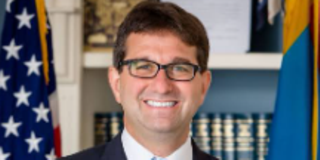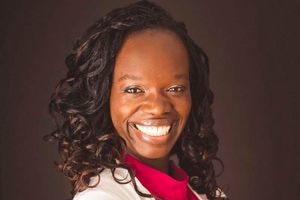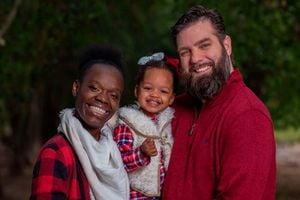
Delaware Governor Matt Meyer.
Matt Meyer, the newly-elected governor of Delaware, stands at the crossroads of two worlds: An American dream, first nurtured in Kenya, and later realised thousands of miles away in the US.
The Democratic Party member won the Delaware governor’s race in the hotly contested US elections that saw former President Donald Trump make a comeback to the White House.
Long before he took to the skies, leaving his birthplace for distant shores, Meyer dreamed of one day becoming a governor in the US.
But it was in Nairobi, at just 21 and as a college student, where he found his deeper calling.
It is in the City Under the Sun that he learned that politics isn’t just about power, but about people, connection, and a shared purpose —a lesson that rooted his conviction like nothing before.
"My journey to being a governor began in childhood," an elated Matt told Nation.Africa just days after his win. "I’ve always loved bringing people together, uniting them in something bigger."
While in Nairobi, he recalled becoming “very good” friends with some of the leaders of the then Student Organisation of Nairobi University (Sonu) and the other student outfits during Moi's time in the 1990s.
And, from them, he said: “I learned the essence of politics, which is helping people, making sure that as many people as possible can get a quality education, quality housing, quality nutritious meals for their children and for their parents and grandparents and neighbours.”
“Those things, those elements of politics that I learned, I've taken with me back home to the US where those same basic principles still apply,” he added.
Meyer grew up in Delaware, attending local schools before studying computer science and political science at Brown University.
But his journey took him much further.
Driven by curiosity and ambition, he left for Nairobi, Kenya, a place that would shape his spirit in unexpected ways. There, he learned Kiswahili, walked the bustling streets, and tasted life on the other side of the world.
Along the way, he studied under the sharp minds of Prof Kivutha Kibwana and Justice Smokin Wanjala at the University of Nairobi.
He learned not only the language but also a new kind of politics, one that was deeply rooted in the lives and struggles of everyday people.
His memories of matatus—the public minibuses—in which he’d often be the only mzungu (white man), hold a special place.
He’d feel a unique warmth as strangers welcomed him into their lives, often inviting him home, sharing meals, and revealing the heart of Kenyan hospitality.
In Nairobi, he later co-founded Ecosandals —a footwear company using recycled materials that would go on to sell eco-friendly shoes in 17 countries across five continents.
For Matt, it was more than a business; it was a bridge between worlds, bringing Kenyan craftsmanship to distant markets and fostering something new from the ground up.
Eventually, he would find himself in Mosul, Iraq, serving as a diplomat embedded with the US Army.
But his time in Kenya lingered, a dream he carried back with him, fueling his conviction to bring people together and give voice to their stories.
His journey from Delaware to Nairobi, and later to the sands of Mosul, was not just about travel; it was a search for connection, humanity, and purpose—a dream nurtured far from home, one he now brings to his role as governor.
When he returned to Delaware and began teaching grade six and seven students mathematics in a public school in Wilmington’s, one of the most underserved communities, he said, he saw first-hand that homework and linear equations were the last thing on his students’ minds when they didn’t know where they were sleeping that night or where their next meal was coming from.
Many of those he taught were living in unstable housing and experiencing the devastating impact of gun violence in their neighborhoods.
“Fed up with unfulfilled promises from politicians and a lack of results for his students and fellow teachers,” his campaign website reads, “Matt ran for office for the first time in 2016, defeating a three-term incumbent by challenging party leaders and powerful special interests and knocking on ten thousand doors.”
He describes himself as having an “unprecedented record of success in delivering results for our communities and families” and “has proven that the Delaware government can still work for the people, investing in education, expanding access to affordable housing, and standing up to the Trump administration to deliver locally.”
A former New Castle County executive, for the campaign, he emphasised his experience as both a teacher and government manager.
He focused on issues like public education reform, which resonated with many voters.
Democrats vs Republicans
With his victory in the just-ended election, Mr Meyer keeps the governor's office under Democratic control, a streak that has lasted for over 30 years. The last time Delawareans elected a Republican was in 1988.
Meyer beat Republican candidate Michael Ramone to secure the seat. But for the Return Day, they sat side by side.
Delaware's Return Day is a unique tradition rooted in both celebration and reconciliation, tracing back to the colonial era —1791— and held two days after the election.
During this day, warring political sides —whether a Democrat, a Republican, an Independent, a Libertarian— bury the hatchet both figuratively and literally.
This signifies that both the election and campaigns are over and what matters going forward, Meyer explained, is you're a Delawarean and you're an American.
“So whatever opposition we've had to Mr Trump in the past, we are a government. The Meyer administration for the state of Delaware is a government of values and principles. We will govern based on those values and principles, no matter who the person is promoting those values and principles,” he explained of his feel about a Trump presidency.
“So if a person is promoting values and principles that help us feed, clothe, provide quality jobs, provide quality shelter, and the highest quality education in every corner of our state, we will support that. And if that individual, whoever it is, whether it's Trump or anyone else, divides, denigrates, demeans people from certain countries, takes away freedoms, tries to kick out people from certain countries, for that we have no tolerance,” he explained.
“For me, it's about the principles. And so we are going to do everything within our power to defend and protect those values that we hold dear. And we hope and we pray that Mr Trump also will cherish those same values,” Meyer added.
A proud husband and father, Meyer lives in Wilmington with his wife, Dr Lauren Meyer.
Together, they have a child.
But he finds himself yearning for the sound of Kiswahili, for the familiar rhythm of words that once became part of his soul.
Whenever he gets the chance, he lets the language roll off his tongue, each phrase a gentle reminder of the warmth of Nairobi streets and the kindness of strangers who welcomed him in a place far from home.
To him, Kiswahili is more than words—it’s a melody of memories, of matatu rides and kibandaski (kiosk) meals, of laughter shared and doors opened.
Speaking it, even just a word or two, brings him closer to the Kenya that shaped him, a world away yet forever close in heart.
He awaits his swearing-in on January 21, 2025, after which he relinquishes the country executive role he has held since 2017.
Meyer’s story may be unique in several ways. But in some ways, it is one of hope, hard work, and the belief that no dream is too far to reach.






